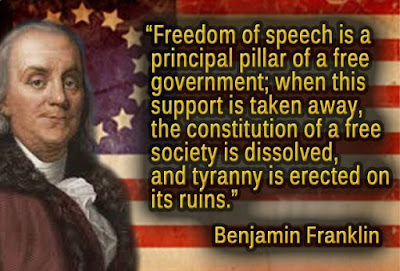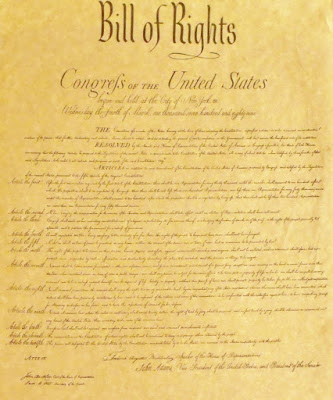Freedom of speech guarantees other freedoms

Quotation on freedom of speech attributed to Benjamin
Franklin (1706-1790), one of the most notable people in the U.S. history, known by being
one of its Founding Fathers in 1776. His image also appears on the 100-dollar bill
Picture:
Reproduction
It is undeniable
to say that, in a typically democratic society such as the United States,
freedom of speech is an absolute element to guarantee to all citizens several
other kinds of civil liberties. Among these rights that are also considered
essential for them, we must mention freedom of religion and freedom of peaceful
assembly.
Thanks to
freedom of speech, people have the right to exercise freely their own religion.
Any person may express his or her belief at home or in public, especially in
churches, mosques, synagogues, stadiums, etc. without any government’s
interference. Moreover, freedom of religion is necessary to respect different
beliefs and accept them, aside from minimizing diverse cases of religious
intolerance.
As well as freedom
of religion, other basic right guaranteed by the First Amendment to the U.S.
Constitution*, in which people can assemble peacefully, also depends on
expressing their own ideas and opinions. Based on this principle, they can get
together anywhere for a certain purpose under peaceful circumstances.
Therefore,
guaranteeing the free exercise of religion, peaceful assembly, and other types
of freedoms is just possible through an essential and unalienable civil liberty
that is called freedom of speech.

The Bill
of Rights (1791), in which includes the
first ten amendments to the U.S. Constitution
Photo:
Reproduction
*
Note about the First Amendment
Ratified in 1791
as a part of a set of the first ten constitutional amendments of the United States called Bill of Rights, the
First Amendment gives American citizens the five basic rights or civil
liberties–freedom of religion, speech, press, assembly, and petition.
Besides its 27 current amendments,
the U.S. Constitution–ratified in 1789, but valid nowadays–, consists, in its
main part, of seven articles. The entire transcription of the First Amendment is
given below:
“Amendment I
Congress shall make no law respecting an establishment
of religion, or prohibiting the free exercise thereof; or abridging the freedom
of speech, or of the press; or the right of the people peaceably to assemble,
and to petition the Government for a redress of grievances.”
Comentários